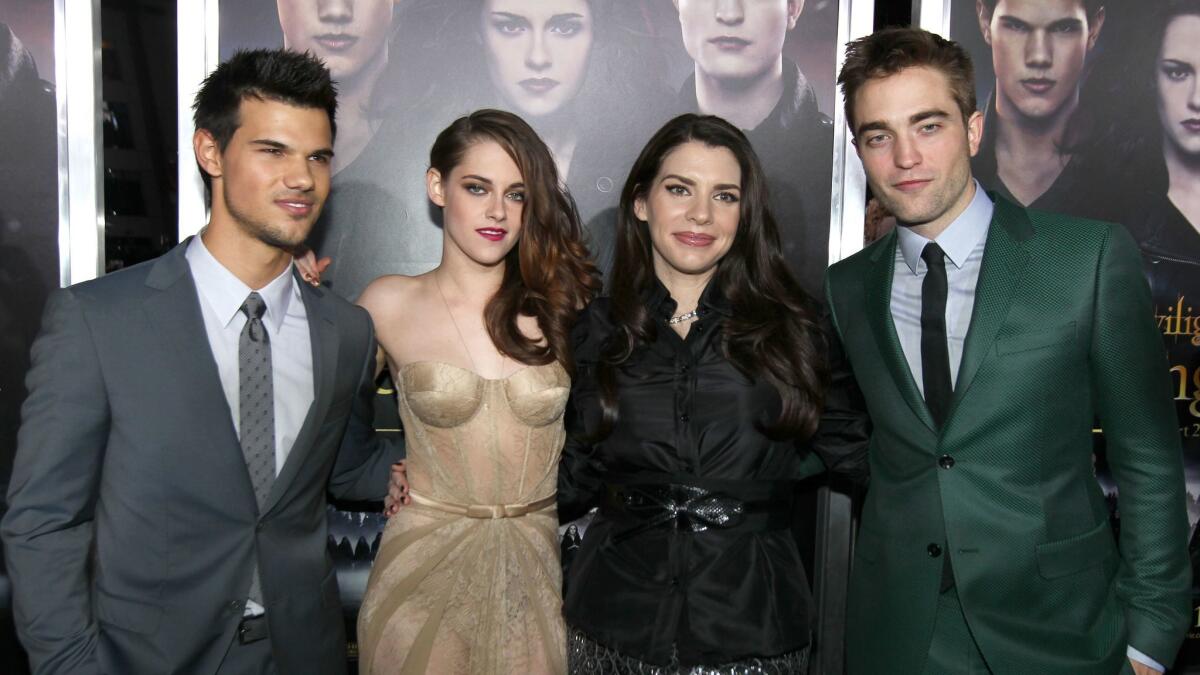Review: Without ‘Twilight’s’ supernatural chill, can Stephenie Meyer still thrill readers?

Stephenie Meyer is one of the most successful writers in the world … but her range so far has been limited to the fantastic world of “Twilight.” Now her new novel, “The Chemist,” substitutes spies for sparkly vampires, and an adult focus for the YA audience.
Many critics will no doubt be skeptical about the outcome. Meyer’s “Twilight” is notorious for its regressive gender roles. Inert, wilting damsel-in-distress Bella and controlling stalker bad-boy Edward have imprinted their abusive relationship dynamics on the forebrains of a generation of young girls, to the horrified irritation of adults and critics everywhere.
For all of Meyer’s bad press, though, the truth is that she has always been more thoughtful than her detractors suggest. Last year’s “Life and Death” rewrote the first “Twilight” novel with genders switched, replacing Bella with Beau and Edward with Edythe.
“The Chemist” works a similar conceit; it’s basically a gender-flipped Robert Ludlum novel.
The heroine of Meyer’s story is so deep undercover that she doesn’t even have a name; Alex is her primary alias. She’s a chemical super-genius who worked for a shadowy government agency as an interrogator. Then she learned something they didn’t want her to know, and her former bosses decided to try to kill her. She’s been on the run for about four years when the novel opens, and her entire life is given over to the basics of survival, keeping “One heart beating, one set of lungs expanding and contracting.” Brutal, efficient, methodical and paranoid, she has lost touch with her own humanity — until she meets sweet-tempered nice guy schoolteacher Daniel, who gives her renewed reason to live for something beyond just drawing the next breath.
Female kick-ass superspy super-sexy superheroes are fairly common on-screen these days, but Alex doesn’t fit the Scarlett Johansson Black Widow mold. She’s a tiny, nondescript woman often mistaken for a boy. She sees herself, and is often seen, as a sexless nerd — she doesn’t use her body as a weapon, in any sense. Instead, she fits masculine geek stereotypes; super-smart, awkward and socially inept. “I’m emotionally backward. Defective even,” she says matter-of-factly. “I evaluate things based on needs and wants. I can’t deal with anything … fluffier.”
Small and physically unimposing, Alex has to out-think her opponents; her victories are sweeter because they’re harder won than the triumphs of all those default Hollywood hard-bodied superspies.
Similarly, the damage done to Alex by her life on the run cuts deeper because it isn’t naturalized by comfortingly expected stereotypes about masculine emotional remoteness. James Bond’s constant alertness seems tough and cool. Alex’s inability to sleep without her gas mask because she’s so used to rigging poison traps to catch intruders in her room is impressive. But it’s also terrifying and sad.
If Alex is an unusual lead female character, Daniel is an even more unusual male one. In most pop culture, whether spy stories or romance novels, leading men are leading men because they’re masculine — strong, competent, dangerous, heroic. There is a man like that in “The Chemist”: Kevin, Daniel’s twin brother, a CIA special ops dude. But Alex has no interest in him. Instead, she’s drawn to Daniel, who is the inverse of the stereotypical masculine ideal — literally, since he’s Kevin’s mirror twin.
The first time Alex and Daniel meet, she injects him with a truth serum-like drug, and he dreamily follows her around like a puppy dog. Even when the medication wears off, that’s more or less his character. Daniel is sweet, unassuming, naïve, passive, “his softly waving hair somehow projecting innocence and pure intentions.” Other talents include cooking; an ability to say, “I love you.” Daniel is, in short, thoroughly feminized — more thoroughly feminized than any main character, male or female, gets to be in most contemporary spy narratives.
Meyer’s sympathy for femininity, and for passivity, is part of what many critics hate about the “Twilight” books. But it gives her an unusual ability to turn genres inside out.
American pop culture tends to celebrate agency and empowerment, not gentleness and getting rescued. When spies and superheroes say they want to retire to a quiet life, it seems unlikely — who would want to be an average schmo when he can keep having all these cool manly adventures?
In “The Chemist,” adventures aren’t exactly manly, and domesticity — home-cooked meals, sleeping beside the one you love sans gas mask — comes across as genuinely appealing. The characters in the novel are motivated by love of family rather than by duty to country or abstractions like saving the world. Love gives the adventure meaning, rather than just being a subplot off to the side.
Spy fans can be assured that in most respects, “The Chemist” functions in much the same way as a Bourne or Bond story, complete with mounting body count, cool explosions, stakeouts and betrayals. But changing the proportion of gender in the genre gives the concoction a renewed, and welcome, rush.
Berlatsky is the author of “Wonder Woman: Bondage and Feminism in the Marston/Peter Comics, 1941-1948” and “The Hammer Dracula Films: and Other Vampires.”
Stephenie Meyer
Little, Brown: 528 pp., $28
More to Read
Sign up for our Book Club newsletter
Get the latest news, events and more from the Los Angeles Times Book Club, and help us get L.A. reading and talking.
You may occasionally receive promotional content from the Los Angeles Times.










